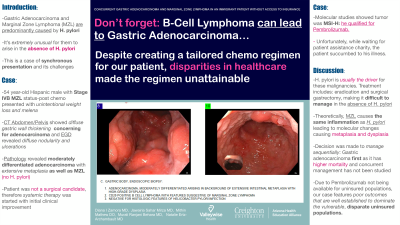Tuesday Poster Session
Category: Stomach
P4244 - Managing Concurrent Gastric Adenocarcinoma and Marginal Zone Lymphoma in an Immigrant Patient Without Access to Insurance
Tuesday, October 24, 2023
10:30 AM - 4:00 PM PT
Location: Exhibit Hall

Has Audio

Diana I Zamora, MD
Creighton University School of Medicine
Scottsdale, AZ
Presenting Author(s)
Diana I Zamora, MD1, Jawairia Sahar Mirza, MD1, Mithin Mathew, DO1, Murali Ranjani Behara, MD1, Natalie Ertz-Archambault, MD2
1Creighton University School of Medicine, Phoenix, AZ; 2Valleywise Health Medical Center, Phoenix, AZ
Introduction: Gastric adenocarcinoma (GA) and Marginal Zone Lymphoma (MZL) are two of the most common causes of gastric cancer, with the former representing 90-95%. H. Pylori has been linked to both malignancies. GA and primary MZL have coexisted only in 0.08% of cases. It is exceedingly rare to see these two malignancies in a patient without H. Pylori. We present a case of concurrent GA and MZL in an H. pylori-negative patient and its management challenges.
Case Description/Methods: 54-year-old male with Stage IVB MZL status-post Rituximab, Vincristine, and Leukeran, presented with 2-week history of significant bouts of bloody diarrhea and general malaise. A CT abdomen revealed diffuse gastric wall thickening and adjacent 1.6 cm hypo-density in the left lateral lobe of the liver, concerning for possible gastric and hepatic neoplasm. He underwent EGD, revealing diffuse nodularity with ulceration and multiple polypoid lesions throughout the stomach and duodenal bulb. His diarrhea subsided with supportive care and he was subsequently discharged for further outpatient evaluation. Biopsy results showed a moderately differentiated GA of the fundus with extensive intestinal metaplasia, high-grade dysplasia and B-Cell Lymphoma with features suggestive of MZL. Biopsies were H.pylori negative. Due to his new diagnosis of GA coexisting with MZL, treating GA as this malignancy warranted higher priority due to its aggressive nature. He was not a candidate for gastrectomy. Five cycles of the Oxaliplatin /Capecitabine regimen were initiated. A subsequent CT imaging unfortunately showed progression of his disease. Due to the limited literature on treatment, the decision was made to treat him for both malignancies simultaneously. Zanubrutinib and Pembrolizumab were added to his regimen. Unfortunately, while awaiting approval for the new regimen, the patient succumbed to his illness.
Discussion: This case is unique because of the coexistence of GA and MZL coupled with the social hinderance caused by lack of insurance. The latter delayed the approval of Pembrolizumab (a novel therapy for MSI-H positive GA) and Zanubrutinib (a novel BTK inhibitor for refractory MZL). This placed the patient between the sword and the wall. Hence, more guidance is needed to navigate therapeutics in concurrent malignancies. It is essential to streamline the process for authorizations for chemotherapeutics, especially for the more vulnerable populations which are prone to getting lost to follow-up, causing poorer outcomes.
Disclosures:
Diana I Zamora, MD1, Jawairia Sahar Mirza, MD1, Mithin Mathew, DO1, Murali Ranjani Behara, MD1, Natalie Ertz-Archambault, MD2. P4244 - Managing Concurrent Gastric Adenocarcinoma and Marginal Zone Lymphoma in an Immigrant Patient Without Access to Insurance, ACG 2023 Annual Scientific Meeting Abstracts. Vancouver, BC, Canada: American College of Gastroenterology.
1Creighton University School of Medicine, Phoenix, AZ; 2Valleywise Health Medical Center, Phoenix, AZ
Introduction: Gastric adenocarcinoma (GA) and Marginal Zone Lymphoma (MZL) are two of the most common causes of gastric cancer, with the former representing 90-95%. H. Pylori has been linked to both malignancies. GA and primary MZL have coexisted only in 0.08% of cases. It is exceedingly rare to see these two malignancies in a patient without H. Pylori. We present a case of concurrent GA and MZL in an H. pylori-negative patient and its management challenges.
Case Description/Methods: 54-year-old male with Stage IVB MZL status-post Rituximab, Vincristine, and Leukeran, presented with 2-week history of significant bouts of bloody diarrhea and general malaise. A CT abdomen revealed diffuse gastric wall thickening and adjacent 1.6 cm hypo-density in the left lateral lobe of the liver, concerning for possible gastric and hepatic neoplasm. He underwent EGD, revealing diffuse nodularity with ulceration and multiple polypoid lesions throughout the stomach and duodenal bulb. His diarrhea subsided with supportive care and he was subsequently discharged for further outpatient evaluation. Biopsy results showed a moderately differentiated GA of the fundus with extensive intestinal metaplasia, high-grade dysplasia and B-Cell Lymphoma with features suggestive of MZL. Biopsies were H.pylori negative. Due to his new diagnosis of GA coexisting with MZL, treating GA as this malignancy warranted higher priority due to its aggressive nature. He was not a candidate for gastrectomy. Five cycles of the Oxaliplatin /Capecitabine regimen were initiated. A subsequent CT imaging unfortunately showed progression of his disease. Due to the limited literature on treatment, the decision was made to treat him for both malignancies simultaneously. Zanubrutinib and Pembrolizumab were added to his regimen. Unfortunately, while awaiting approval for the new regimen, the patient succumbed to his illness.
Discussion: This case is unique because of the coexistence of GA and MZL coupled with the social hinderance caused by lack of insurance. The latter delayed the approval of Pembrolizumab (a novel therapy for MSI-H positive GA) and Zanubrutinib (a novel BTK inhibitor for refractory MZL). This placed the patient between the sword and the wall. Hence, more guidance is needed to navigate therapeutics in concurrent malignancies. It is essential to streamline the process for authorizations for chemotherapeutics, especially for the more vulnerable populations which are prone to getting lost to follow-up, causing poorer outcomes.
Disclosures:
Diana I Zamora indicated no relevant financial relationships.
Jawairia Sahar Mirza indicated no relevant financial relationships.
Mithin Mathew indicated no relevant financial relationships.
Murali Ranjani Behara indicated no relevant financial relationships.
Natalie Ertz-Archambault indicated no relevant financial relationships.
Diana I Zamora, MD1, Jawairia Sahar Mirza, MD1, Mithin Mathew, DO1, Murali Ranjani Behara, MD1, Natalie Ertz-Archambault, MD2. P4244 - Managing Concurrent Gastric Adenocarcinoma and Marginal Zone Lymphoma in an Immigrant Patient Without Access to Insurance, ACG 2023 Annual Scientific Meeting Abstracts. Vancouver, BC, Canada: American College of Gastroenterology.
